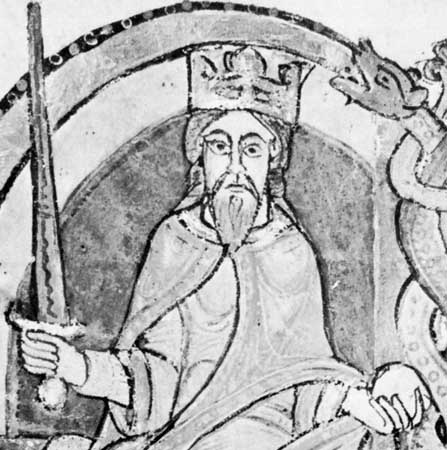David I
king of Scotland
born c. 1082
died May 24, 1153, Carlisle, Cumberland, Eng.
 one of the most powerful Scottish kings (reigned from 1124). He admitted into Scotland an Anglo-French (Norman) aristocracy that played a major part in the later history of the kingdom. He also reorganized Scottish Christianity to conform with continental European and English usages and founded many religious communities, mostly for Cistercian monks and Augustinian canons.
one of the most powerful Scottish kings (reigned from 1124). He admitted into Scotland an Anglo-French (Norman) aristocracy that played a major part in the later history of the kingdom. He also reorganized Scottish Christianity to conform with continental European and English usages and founded many religious communities, mostly for Cistercian monks and Augustinian canons.The youngest of the six sons of the Scottish king Malcolm III Canmore and Queen Margaret (afterward St. Margaret), David spent much of his early life at the court of his brother-in-law King Henry I of England. Through David's marriage (1113) to a daughter of Waltheof, earl of Northumbria, he acquired the English earldom of Huntingdon and obtained much land in that county and in Northamptonshire. With Anglo-Norman help, David secured from his brother Alexander I, king of Scots from 1107, the right to rule Cumbria, Strathclyde, and part of Lothian. In April 1124, on the death of Alexander, David became king of Scots.
David recognized his niece, the Holy Roman empress Matilda (died 1167), as heir to Henry I in England, and from 1136 he fought for her against King Stephen (crowned as Henry's successor in December 1135), hoping thereby to gain Northumberland for himself. A brief peace made with Stephen in 1136 resulted in the cession of Cumberland to David and the transfer of Huntingdon to his son Earl Henry. David, however, continued to switch sides. While fighting for Matilda again, he was defeated in the Battle of the Standard, near Northallerton, Yorkshire (Aug. 22, 1138). He then made peace once more with Stephen, who in 1139 granted Northumberland (as an English fief) to Earl Henry. In 1141 David reentered the war on Matilda's behalf, and in 1149 he knighted her son Henry Plantagenet (afterward King Henry II of England), who acknowledged David's right to Northumberland.
In Scotland, David created a rudimentary central administration, issued the first Scottish royal coinage, and built or rebuilt the castles around which grew the first Scottish burghs: Edinburgh, Stirling, Berwick, Roxburgh, and perhaps Perth. As ruler of Cumbria he had taken Anglo-Normans into his service, and during his kingship many others settled in Scotland, founding important families and intermarrying with the older Scottish aristocracy. Bruce, Stewart, Comyn, and Oliphant are among the noted names whose bearers went from northern France to England during the Norman Conquest in 1066 and then to Scotland in the reign of David I. To these and other French-speaking immigrants, David granted land in return for specified military service or contributions of money, as had been done in England from the time of the Conquest.
- puli
- Pulicat Lake
- Pulitzer, Joseph
- Pulitzer Prize
- Pulkovo Observatory
- pulley
- Pullman
- Pullman, George M
- Pullman Strike
- pulmonary alveolar proteinosis
- pulmonary alveolus
- pulmonary circulation
- pulmonary embolism
- pulmonary fibrosis
- pulmonary stenosis
- pulmonate
- pulpit
- pulque
- pulsar
- pulse
- pulvinated frieze
- Pulzone, Scipione
- puma
- pumice
- pump